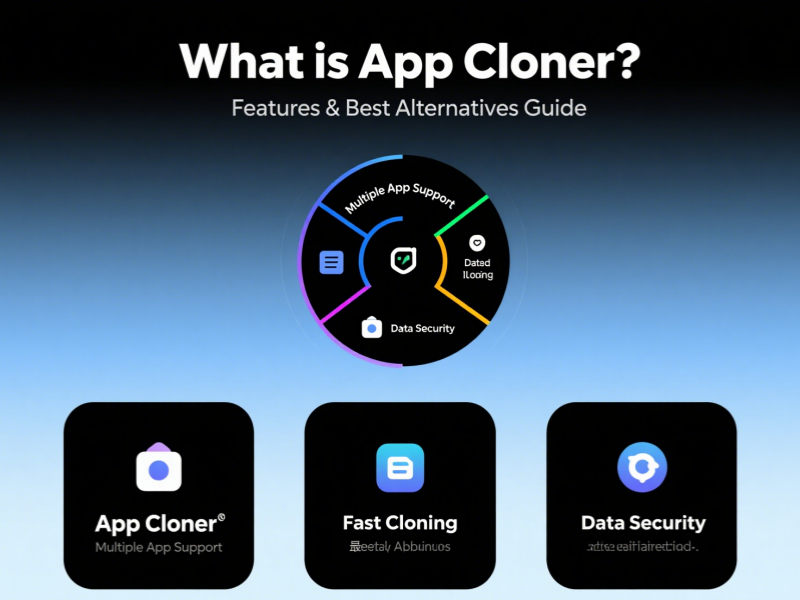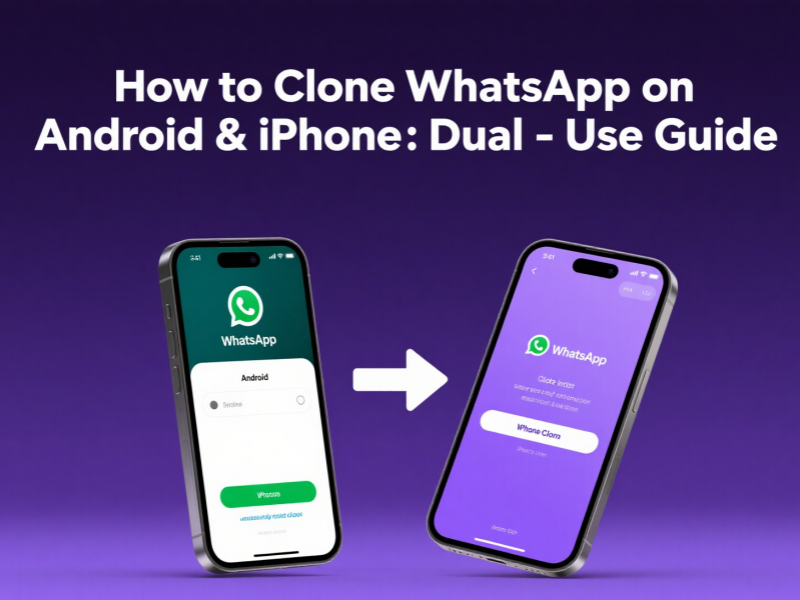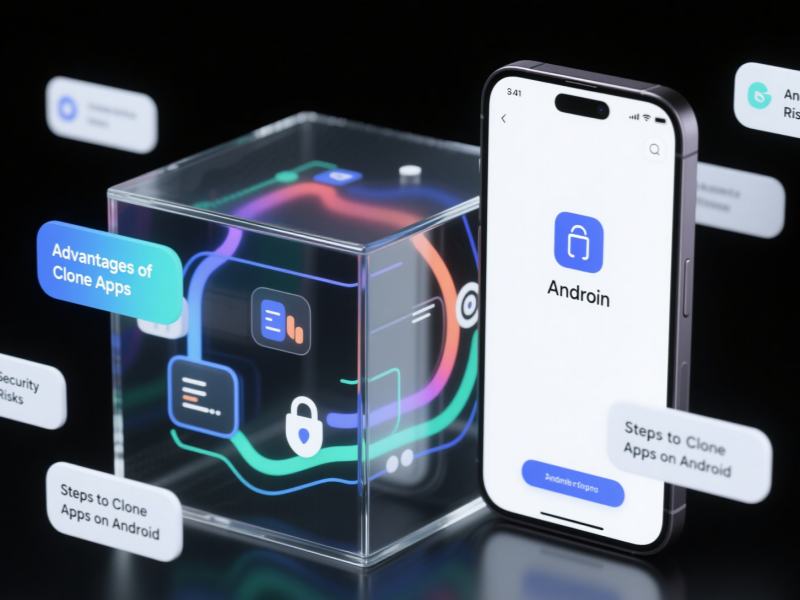In today’s digital social age, Facebook has become an important platform for us to show our lives, build connections, and conduct business. But at the same time, the problem of “Facebook clone” is getting worse and worse – your Facebook account may be copied, impersonated, or even abused, resulting in damaged interpersonal relationships, privacy leaks, and even property damage. Therefore, this article will deeply analyze what a Facebook clone is, why you are cloned on Facebook, how to identify and remove cloned Facebook accounts, and how to quickly deal with impersonation.

What is a Facebook Clone?
The so-called Facebook Clone means that someone has copied your Facebook profile, avatar, cover, name, and even posted content without your permission, and used this information to create a “cloned account (Cloned Facebook Account). And, this account looks almost exactly like your account, and may even actively add your friends and post similar dynamics, causing great trouble.
Common cloning behaviors include:
- Using the same avatar and name as you;
- Copying your public profile and cover photo;
- Imitating your posting style and frequency;
- Adding your relatives and friends, sending them private messages to defraud or obtain information;
- Using your identity to spread rumors and false information.
Why Are You Cloned on Facebook?
The following types of users are more likely to encounter cloning behaviors:
- The public permissions are too wide: such as avatars, posts, and friend lists are all public.
- High activity: celebrities, KOLs, and corporate accounts are more likely to become targets;
- Have been led by phishing links to leak information;
- Account names and avatars are easy to copy;
- Users who use multiple accounts with the same name are easily impersonated by scammers.
Risks of a Cloned Facebook Account
Being cloned is not only embarrassing, but may also lead to the following serious consequences:
|
Risk Type
|
Description
|
| Privacy leakage |
Imitators can guide others to share private content |
| Interpersonal misleading |
Friends and relatives mistakenly think that you are the one who posted the dynamic |
| Property risk |
impersonation to defraud of money |
| Reputation damage |
Improper remarks affect the trust of social circles |
| Business fraud |
The identity of the company or KOL is counterfeited and causes a brand crisis |
How to identify whether Facebook is cloned?
The following are common clues:
✅ Method 1: Friend reminder
Usually, you will know through friend reminders: “I just received your friend request, but you are not my friend anymore?” This may be a sign of cloned Facebook.
✅ Method 2: Search your own name
- Open Facebook and search for your name.
- Check whether there are multiple accounts with the same avatar and cover as yours.
- Pay attention to whether the profile and number of friends are abnormal.
✅ Method 3: Receive reports from strangers about your impersonation account
If multiple strangers report you for “fraud” or “harassment”, it may not be that you really have a problem, but that cloned accounts are rampant.
How to Remove a Cloned Facebook Account?
When you are sure that your Facebook account has been cloned, the first reaction is: How to delete the fake account?
The steps are as follows:
- Report the cloned account
- Go to the homepage of the cloned account.
- Click the “···” button in the upper right corner;
- Select “Find support or report profile.”;
- Click “Impersonate others.”;
- Select “Myself”;
- Submit the report.
Notify your friends
Remind your friends not to accept friend requests from the account, and guide them to report together, which will help the platform block the account faster.
Complain to Facebook customer service (corporate/well-known account)
If you have a certification mark or company homepage, you can verify your identity and speed up the processing through the Facebook business support channel.
What to Do if Your Facebook Account is Cloned?
When you find that your Facebook account has been cloned, the first thing to do is to report and remove the fake account. Facebook provides a clear process to deal with this kind of impersonation. Here are the specific steps:
✅ Step 1: Find the cloned account
- Open the Facebook search bar.
- Enter your name to see if there are accounts similar to your profile picture and cover photo.
- Go to the homepage of the suspected cloned account.
✅ Step 2: Report the fake account
- In the upper right corner of the fake account’s homepage, click the “···” (More) button;
- Select [Find support or report profile].
- Click [Pretending to Be Someone];
- Select [Me] in the prompt.
- Submit the report according to the prompt, and Facebook will review it.
| 💡 Tip: If the fake account has established contact with your relatives and friends, you can also ask them to report together to speed up the processing. |
✅ Step 3: Guide friends to identify fake accounts
To prevent your friends and family from being scammed, I recommend that you:
- Publish a public statement on your real account to remind everyone not to accept friend requests from new accounts.
- Use screenshots to prove your identity, such as account registration time, authentication information, etc.
✅ Step 4: Complain through Facebook’s identity verification channel (applicable to enterprises/KOLs)
If you are a corporate account, a blue V account, or have a large fan base, you can use Facebook’s identity verification channel to provide proof of identity (such as a passport, business license, etc.) to allow the platform to remove fake accounts faster.
📌 Recommended measures:
| Protection measures |
Operation suggestions |
| Modify privacy permissions |
Limit the public visibility of avatars, covers, and friend lists |
| Enable two-step verification |
Add a mobile phone or authenticator to enhance account security |
| Regularly check for cloning risks |
Search your name every month to prevent fake reappearances |
Timely reporting and timely communication are the best ways to deal with Facebook cloning.
The difference between Facebook Clone and “Facebook Clone App”
Many people mistake “Facebook clone” for “Facebook Clone App”.
📌 The explanation is as follows:
- Facebook Clone (account impersonation): refers to your identity and information being impersonated by others.
- Facebook Clone App (platform cloning): refers to a social platform developed based on Facebook functions, such as open source projects, PHP scripts, etc., which are usually used to build Facebook-like websites.
There is an essential difference between the two, and this article mainly discusses the former.
Facebook Clone Case Analysis
🎯 Case 1: Businessman Mr. Wang was cloned
Mr. Wang runs several stores and often shares business opportunities on Facebook. One day, relatives and friends called and said that he had sent “borrowing money” messages again. It turned out that the cloned Facebook account was borrowing money from all his friends!
Response: Report + multiple complaints + notice reminder, the account was blocked after 3 days.
🎯 Case 2: Student Ms. Lin’s account was impersonated
Ms. Lin encountered the outrageous situation of “applying for her own friends”. What’s worse, the cloned account kept posting “Internet celebrity loan” advertisements, causing her classmates to misunderstand that she was doing a micro-business.
Result: Ms. Lin deleted the cloned account + changed the information + applied for account verification, and finally solved it.
How to prevent Facebook from being cloned?
| Method |
Operation suggestions |
| Limit the visibility of the avatar |
Friends only or private |
| Turn off the public friend list |
Set to “Visible only to me” |
| Set timeline restrictions |
Do not allow others to tag you |
| Improve account verification |
Enable two-factor authentication, and submit an ID card |
| Regular self-check |
Search your name every month to check if there are any fake accounts |
Tool recommendation: How to open multiple accounts (not cloned) through Parallel Space
If you want to log in to two of your own Facebook accounts at the same time (not cloned), you can use an app cloner such as
Parallel Space.
📱 Parallel Space highlights:
- Supports logging in to multiple Facebook accounts on the same device;
- App clones do not interfere with each other.
- Compatible with multiple social platforms such as WhatsApp, Instagram, Messenger, etc.
| Note: This “cloning” is authorized by you, which is different from the “impersonating others” mentioned above and is legal and compliant. |
Summary
When you find yourself being cloned by Facebook, it is crucial to stay calm and respond quickly. Through the detailed analysis of this article, you have mastered:
- What is cloned Facebook?
- How to identify and report fake accounts.
- How to improve the protection level of your account.
- The best response measures when encountering impersonation.
- How to use tools to legally open multiple accounts.
In the digital age, we should not only enjoy the convenience of social interaction but also learn to protect ourselves. Please forward this article to your friends, and work together to enhance awareness and create a safer social environment!
FAQ
1. What is a Facebook Clone? Is it the same as having your account stolen?
Facebook Clone means someone else copies your profile picture, name, profile, and other information without authorization to create a fake account that looks exactly like you. Unlike a stolen account, cloning does not control your real account, but creates a new account that impersonates you.
2. What should I do if my Facebook account is cloned?
You should report the fake account immediately by going to the account homepage → click “···” → Report profile → Select “Impersonate me”. At the same time, issue an announcement to remind relatives and friends, and suggest that they report together. Enterprises or certified users can also speed up the processing through Facebook customer service channels.
3. How to prevent Facebook from being cloned by others?
It is recommended that you take the following measures: set your profile picture and cover to “only visible to friends”; hide your friend list; turn off strangers’ message permissions; enable two-step verification; and search your name regularly to check if there are cloned accounts. These settings can effectively reduce the risk of being cloned.




